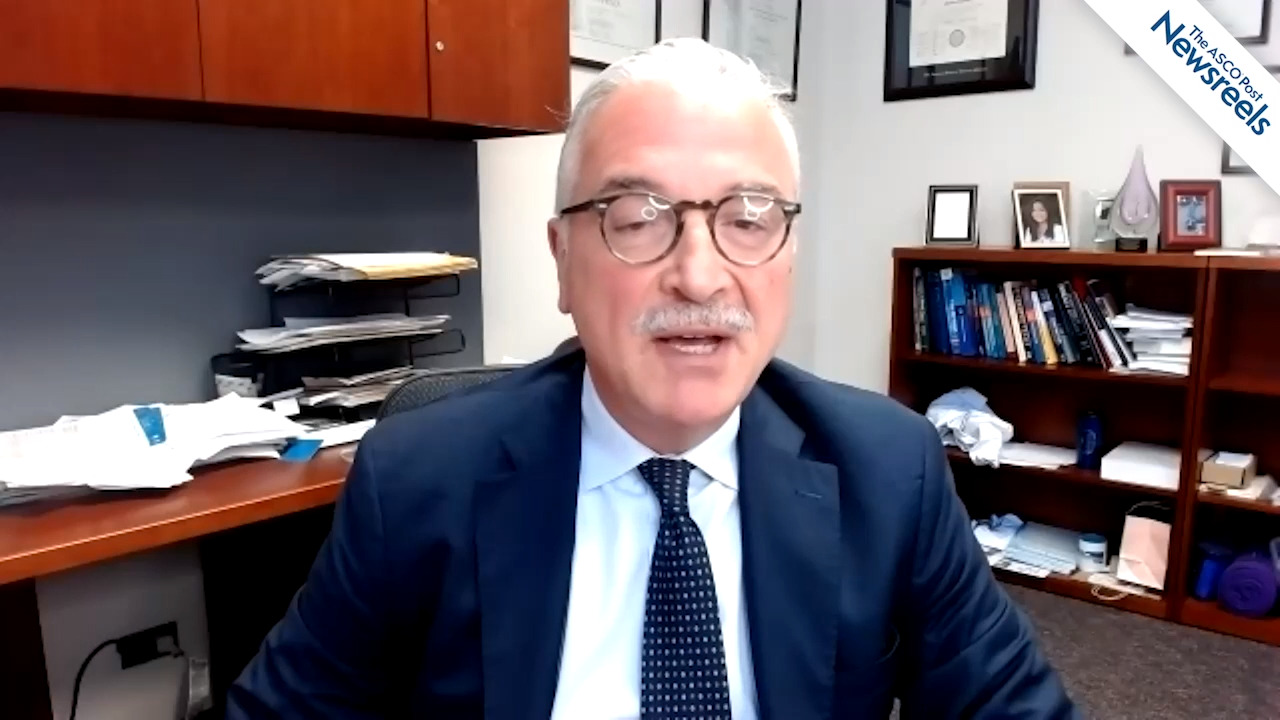Use of Integrative Medicine by Patients With Breast Cancer
Nearly three-quarters of patients with breast cancer (73%) reported using at least one type of complementary medicine after cancer diagnosis, while surveyed oncologists believed that less than half (43%) of patients were using these approaches during cancer care. These and other findings from a...
Ingrid A. Mayer, MD, on Triple-Negative Breast Cancer: Platinum-Based Chemotherapy vs Capecitabine
Ingrid A. Mayer, MD, of Vanderbilt University Medical Center, discusses phase III results from a trial that showed patients with triple-negative breast cancer who had residual invasive disease after neoadjuvant chemotherapy had lower-than-expected invasive disease–free survival, regardless of study treatment with platinum-based chemotherapy or capecitabine (Abstract 605).
Massimo Cristofanilli, MD, on Breast Cancer: Updated Analysis on Palbociclib Plus Fulvestrant
Massimo Cristofanilli, MD, of the Feinberg School of Medicine at Northwestern University, discusses updated overall survival data from the phase III PALOMA-3 trial of palbociclib plus fulvestrant in women with hormone receptor–positive, HER2-negative advanced breast cancer (Abstract 1000).
Efficacy of Platinum Chemotherapy vs Capecitabine for Basal-Like Triple-Negative Breast Cancer
About 80% of triple-negative breast cancers are classified as the subtype basal-like. Typically, patients with triple-negative breast cancer receive chemotherapy before surgery. The presence of residual cancer in the breast after chemotherapy signals a higher likelihood that the cancer will...
Study Examines Relationship Between Risk of COVID-19 Infection and Breast Cancer Treatment
In a study led by researchers at NYU Langone Health and its Perlmutter Cancer Center involving more than 3,000 women treated for breast cancer at the height of the COVID-19 pandemic in New York City, only 64 patients, or 2% of the total study population, contracted the virus. Of this group, 10 died ...
Andrew Tutt, PhD, MBChB, on Breast Cancer: Olaparib After Chemotherapy in Germline BRCA1/2–Mutated Tumors
Andrew Tutt, PhD, MBChB, of the Institute of Cancer Research, London, discusses findings from the phase III OlympiA trial, which showed that adjuvant olaparib, a PARP inhibitor, following adjuvant or neoadjuvant chemotherapy, may improve invasive disease–free survival in patients with germline BRCA-mutated and high-risk HER2-negative early breast cancer, which might lead to a new indication in this setting (Abstract LBA1).
OlympiA: Adjuvant Olaparib Extends Disease-Free Survival in BRCA-Mutated Early-Stage HER2-Negative Breast Cancer
One year of adjuvant therapy with the PARP inhibitor olaparib extended disease-free survival in patients with high-risk, early-stage, HER2-negative breast cancer with BRCA1/2 germline mutations, according to a prespecified interim analysis of the phase III OlympiA trial presented by Andrew Tutt, MB ...
Study Examines Aromatase Inhibitor–Associated Musculoskeletal Symptoms in a Diverse Population With Early Breast Cancer
A clinical trial in a racially diverse group of postmenopausal women with early breast cancer to study severe pain in the bones, muscles, ligaments, tendons, and nerves caused by aromatase inhibitor treatment has found that the symptoms were more commonly reported in Black and Asian patients than...
Noninvasive Imaging Biomarker and Pathologic Complete Response to Neoadjuvant Pertuzumab/Trastuzumab in HER2-Positive Breast Cancer
As reported in the Journal of Clinical Oncology by Roisin M. Connolly, MD, and colleagues, updated results of the phase II TBCRC026 trial indicate an association of early F-18 fluorodeoxyglucose positron-emission tomography/computed tomography (F-18 FDG PET/CT) maximum standardized uptake value...
Are There Differences in the Prevalence of Germline Pathogenic Variants in Susceptibility Genes in Black vs White Women With Breast Cancer?
In a population-based study reported in JAMA Oncology, Susan M. Domchek, MD, and colleagues found “no clinically meaningful differences” in the prevalence of germline pathogenic variants in 12 established breast cancer susceptibility genes between Black and non-Hispanic White women with breast...
Neoadjuvant Chemotherapy De-escalation Using F-18 FDG-PET Response–Based Strategy in HER2-Positive Breast Cancer
In the European phase II PHERGain study reported in The Lancet Oncology, Pérez-García et al found that an F-18 fluorodeoxyglucose positron-emission tomography (F-18 FDG-PET) response–based strategy may be able to identify patients with HER2-positive early breast cancer who may benefit from...
New Approaches Needed for Patients With Locoregional Breast Cancer Progression During Neoadjuvant Systemic Therapy
Patients with breast cancer who experience disease progression on neoadjuvant systemic therapy tend to have poor survival outcomes, even after surgical management, according to a study presented during the 2021 American Society of Breast Surgeons Annual Meeting.1 Findings from the retrospective...
Three-Year Outcomes After Neoadjuvant Chemotherapy With or Without Anthracycline Plus Dual HER2 Blockade in HER2-Positive Breast Cancer
In a secondary analysis of the Dutch phase III TRAIN-2 trial reported in JAMA Oncology, Anna van der Voort, MD, and colleagues found similar 3-year event-free and overall survival in patients with HER2-positive breast cancer receiving neoadjuvant therapy with vs without an anthracycline plus dual...
FDA ODAC Meeting Focuses on ‘Dangling’ Accelerated Approvals of Anti–PD-1/PD-L1 Antibodies
In a perspective in The New England Journal of Medicine, Julia A. Beaver, MD, and Richard Pazdur, MD, of the U.S. Food and Drug Administration (FDA) Oncology Center of Excellence (OCE), discussed issues surrounding “dangling” accelerated approvals of anti–PD-1/PD-L1 antibodies—ie, approvals for...
Inequities in Breast Cancer Screening During the COVID-19 Pandemic
Breast cancer screening took a sizeable hit during the COVID-19 pandemic, according to new research showing that the number of screening mammograms completed in a large group of women living in Washington state plummeted by nearly half. Published by Amram et al in JAMA Network Open, the study...
Study Reveals Differences in Treatment and Mortality Between Black and White Women With Nonmetastatic Triple-Negative Breast Cancer
In a population-based retrospective cohort study reported in JAMA Oncology, Cho et al found that Black women with nonmetastatic triple-negative breast cancer were less likely than White women to receive chemotherapy and surgery and were at higher risk of breast cancer mortality. Study Details The...
Risk of Second Cancer by Hormone Receptor Status Among Breast Cancer Survivors
A new study has found breast cancer survivors in general have higher risk of new cancer diagnosis compared to healthy individuals. The article, published by Hyuna Sung, PhD, and colleagues in the journal Cancer, stated that compared to the general population in the United States, the risk of new...
Axillary Node Pathologic Complete Response After Systemic Neoadjuvant Therapy According to Breast Cancer Subtype
In a systematic review and meta-analysis reported in JAMA Surgery, Samiei et al found that among breast cancer subtypes, the highest rates of axillary node pathologic complete response following systemic neoadjuvant therapy were in patients with hormone receptor (HR)-negative, HER2-positive disease ...
Pertuzumab/High-Dose Trastuzumab in Patients With HER2-Positive Metastatic Breast Cancer and Progressive Brain Metastases
In the phase II PATRICIA trial reported in the Journal of Clinical Oncology, Nancy U. Lin, MD, and colleagues found that pertuzumab plus high-dose trastuzumab produced central nervous system (CNS) objective responses and clinical benefit in 68% of patients with HER2-positive metastatic breast...
Abemaciclib-Associated Adverse Events: Safety Analysis of monarchE
Treatment with abemaciclib, an orally available inhibitor of CDK4/6, has been associated with venous thromboembolic events (VTE), elevated aminotransferases (EAT), and interstitial lung disease (ILD). Although more episodes of VTE, EAT, and ILD were reported in patients receiving abemaciclib plus...
Cardiac Safety, Efficacy of Neoadjuvant Pertuzumab/Trastuzumab for Early-Stage HER2-Positive Breast Cancer
Long-term cardiac safety and efficacy have been confirmed for the combination of pertuzumab plus trastuzumab in patients with early-stage HER2-positive breast cancer, according to the final analysis of the phase II BERENICE trial reported by Chau T. Dang, MD, and colleagues at the ESMO Breast...
Long-Term Follow-up of Premenopausal Patients With Estrogen Receptor–Positive Breast Cancer: Goserelin and Tamoxifen
A 20-year follow-up of premenopausal patients with estrogen receptor–positive breast cancer and stratification by the molecular 70-gene risk signature suggested that patients at high risk of distant disease recurrence derive significant benefit from goserelin, while patients at low risk have...
ACMG Clinical Practice Resource Provides New Guidance for Management of Individuals With PALB2 Gene Variants
The American College of Medical Genetics and Genomics (ACMG) has released a clinical practice resource from a global team of specialists in cancer genetics that will help inform the clinical management of patients who harbor a PALB2 variant and may be at increased risk of developing breast,...
Incidence of Interstitial Lung Disease Related to Trastuzumab Deruxtecan-nxki in Patients With HER2-Positive Metastatic Breast Cancer
Drug-related interstitial lung disease occurred in less than 16% of patients with HER2-positive metastatic breast cancer following treatment with trastuzumab deruxtecan-nxki (T-DXd) at the approved dose of 5.4 mg/kg. In addition, the majority of these cases were classified as grade 1 or 2,...
Atezolizumab/Carboplatin as Immune Induction in Patients With Metastatic Invasive Lobular Breast Cancer
First results from the phase II GELATO study evaluating atezolizumab plus carboplatin presented at the ESMO Breast Cancer Virtual Congress 2021 demonstrated clinical benefit in patients with metastatic invasive lobular breast cancer, particularly in patients with triple-negative invasive lobular...
Long-Term Analysis of Short-HER Trial Reported: Shorter Duration of Adjuvant Trastuzumab in HER2-Positive Early Breast Cancer
Long-term analysis of the Short-HER trial showed that 9 weeks of adjuvant trastuzumab conveyed benefits comparable to a 1-year course in patients with early HER2-positive breast cancer deemed to be at low or intermediate risk for disease recurrence. High-risk patients, however, derived considerably ...
Biomarker Analysis of the KAITLIN Trial: No Subgroup Benefits More From T-DM1 Plus Chemotherapy
In the phase III KAITLIN trial, replacing adjuvant taxane and trastuzumab with ado-trastuzumab emtansine (T-DM1) did not result in a significant improvement in invasive disease-free survival in the node-positive or intent-to-treat population, as reported by Harbeck et al at the 2020 ASCO Virtual...
Evolution to HER2-Low Breast Cancer: Investigating Potential Therapeutics
The finding that breast tumors can evolve to express low HER2 potentially increases the number of patients who can benefit from new investigational agents, typically novel antibody-drug conjugate therapies, that are currently in clinical trials for HER2-low tumors. This research was presented by...
Margetuximab-cmkb: A Novel Agent Overshadowed by an Abundance of Options in HER2-Positive Breast Cancer
It is incredible to reflect upon the scientific advances in the treatment of HER2-positive breast cancer over the past 23 years. Once considered the worst subtype of breast cancer, HER2-positive disease is now associated with the best long-term outcomes in this age of targeted treatments. With a...
Margetuximab-cmkb Plus Chemotherapy Prolongs Progression-Free Survival in Heavily Pretreated HER2-Positive Breast Cancer
As reported in JAMA Oncology by Hope S. Rugo, MD, of the University of California San Francisco Helen Diller Family Comprehensive Cancer Center, and colleagues, the phase III SOPHIA trial has shown significantly prolonged progression-free survival with margetuximab-cmkb plus chemotherapy vs...
First-Line Pembrolizumab Plus Chemotherapy in PD-L1–Positive Locally Recurrent Triple-Negative Breast Cancer
As reported in The Lancet by Javier Cortes, MD, of the International Breast Cancer Center, Quiron Group, Madrid and Barcelona, and colleagues, the second interim analysis of the phase III -KEYNOTE-355 trial has shown that the addition of pembrolizumab to chemotherapy improved progression-free...
John Marshall, MD, and Liza Marshall: When Cancer Strikes an Oncologist’s Family
John Marshall, MD, of the Lombardi Cancer Center at Georgetown University, and his wife, Liza Marshall, a breast cancer survivor, talk about the impact of her diagnosis, how it changed their view of cancer care and the way clinicians communicate, and why their memoir has an important message.
Relationship Between Germline BRCA Pathogenic Variants and Diminished Ovarian Reserve
In a study reported in the Journal of Clinical Oncology, Turan et al found the presence of germline BRCA pathogenic variants was associated with diminished ovarian reserve in young women, particularly in those diagnosed with breast cancer and those with BRCA1 variants. Study Details The individual...
Early Triple-Negative Breast Cancer: Are Checkpoint Inhibitors Ready for Neoadjuvant or Adjuvant Use?
Recent clinical trials have been encouraging for the neoadjuvant or adjuvant use of immune checkpoint inhibitors in triple-negative breast cancer, but is this approach ready for the clinic? This question was addressed at PER’s Miami Breast Cancer Conference, held virtually this year, by Adam M....
Fertility Concerns May Influence Decisions About Endocrine Therapy in Young Women With Breast Cancer
Concerns about fertility often influence how young women with breast cancer approach treatment decisions and are a reason for forgoing or delaying hormone-blocking therapy, according to findings from a recent study published by Sella et al in the journal Cancer. The findings reinforce the need for...
Adjuvant Trastuzumab With or Without Chemotherapy in Older Patients With HER2-Positive Breast Cancer: Health-Related Quality of Life
In an analysis from the Japanese RESPECT trial reported in the Journal of Clinical Oncology, Taira et al found that adjuvant trastuzumab monotherapy was associated with better health-related quality of life (QoL) vs trastuzumab plus standard chemotherapy for at least 12 months in women aged 70 to...
Breast Reconstruction Disparities Improved With Medicaid Expansion
Medicaid expansion under the Affordable Care Act was associated with significant increases in breast reconstruction among non-Hispanic Black women, achieving parity at times with non-Hispanic White women, according to a new study presented by Sharon Lum, MD, and colleagues at the American Society...
Low-Risk Breast Cancer Survivors May Experience Long-Term Physical and Psychological Effects
Survivors of low-risk breast cancer may experience wide-ranging and significant physical and psychological symptoms after cancer treatment, according to a new study presented by Jessica Schumacher, PhD, and colleagues at the American Society of Breast Surgeons (ASBrS) Annual Meeting. Researchers...
Cryoablation Emerging as Effective Treatment for Low-Risk Breast Cancers
Nonsurgical breast cancer cryoablation, which destroys tumor cells by exposing them to subfreezing temperatures, is proving to be an effective alternative to surgery for small breast tumors with low-risk features in women older than age 60. These were the early findings from 3-year results of the...
COVID-19 Pandemic Drove Strategic New Breast Cancer Approaches to Avoid Hospitalization
The COVID-19 pandemic rapidly altered breast cancer treatment approaches, with a significant rise in neoadjuvant endocrine therapy for estrogen receptor–positive tumors, enabling immediate evidence-based treatment of women with an extremely common form of breast cancer, while delaying surgery and...
Sacituzumab Govitecan-hziy Improves Survival vs Single-Agent Chemotherapy in Metastatic Triple-Negative Breast Cancer
As reported in The New England Journal of Medicine by Aditya Bardia, MD, of the Division of Medical Oncology, Massachusetts General Hospital Cancer Center, and colleagues, the phase III ASCENT trial has shown prolonged progression-free and overall survival with the Trop-2–directed antibody-drug...
FDA ODAC Votes in Favor of Maintaining Accelerated Approval of Atezolizumab/Nab-paclitaxel for PD-L1–Positive, Metastatic Triple-Negative Breast Cancer
Roche announced that the U.S. Food and Drug Administration (FDA) Oncologic Drugs Advisory Committee (ODAC) voted seven to two in favor of maintaining accelerated approval of atezolizumab in combination with chemotherapy (nanoparticle albumin-bound paclitaxel, or nab-paclitaxel) for the treatment of ...
Safety of Stereotactic Body Radiotherapy for Patients With Multiple Metastases
In the phase I NRG-BR001 trial reported in JAMA Oncology, Chmura et al found that stereotactic body radiotherapy (SBRT) could be used safely to treat multiple metastases in patients with breast, lung, and prostate cancers. Study Details The trial was conducted within a consortium of North...
Grateful to Be Alive
Everything about my breast cancer diagnosis, from my presentation to diagnosis, was strange. In the spring of 2006, I was performing my monthly breast self-exam when I felt a hard lump in the upper left quadrant of my left breast. Having lost a good friend to breast cancer 4 years earlier, I was...
Improvement Programs to Optimize Patient Care for Black Americans With Breast Cancer
Eight oncology practices in eight different U.S. metropolitan areas with high rates of breast cancer disparities between Black and White Americans have been selected to participate in ASCO’s quality programs, including the Quality Oncology Practice Initiative (QOPI®)and Quality Training Program...
New ASCO Guideline Offers Recommendations for Neoadjuvant Breast Cancer Treatment
ASCO has released a new guideline regarding the use of neoadjuvant chemotherapy, endocrine therapy, and targeted therapy in breast cancer.1 “This is the first time ASCO has embarked on a guideline for neoadjuvant therapy,” said Larissa A. Korde, MD, of the National Cancer Institute, and guideline...
Pembrolizumab Monotherapy for Heavily Pretreated Patients With Metastatic Breast Cancer and High Tumor Mutational Burden
Findings from the ASCO-designed phase II Targeted Agent and Profiling Utilization Registry (TAPUR) basket trial, reported in the Journal of Clinical Oncology by Alva et al, indicated that pembrolizumab showed activity in heavily pretreated patients with metastatic breast cancer and high mutational...
Alpelisib Plus Fulvestrant in PIK3CA-Mutant, Hormone Receptor–Positive, HER2-Negative Advanced Breast Cancer After Disease Progression
As reported in The Lancet Oncology by Hope S. Rugo, MD, and colleagues, findings in one cohort of the phase II BYLieve trial indicated activity of the PI3Kα-selective inhibitor and degrader alpelisib plus fulvestrant in patients with PIK3CA-mutated, hormone receptor–positive, HER2-negative advanced ...
Long-Term Outcomes With Electron Intraoperative Irradiation vs Whole-Breast Irradiation for Early Breast Cancer
As reported in The Lancet Oncology by Orecchia et al, preplanned long-term follow-up in the Italian single-center phase III ELIOT trial continued to show a higher rate of ipsilateral breast tumor recurrence with electron intraoperative radiotherapy vs postoperative whole-breast irradiation, with no ...
PENELOPE-B: Palbociclib for Residual Invasive HR-Positive, HER2-Negative Early Breast Cancer After Neoadjuvant Chemotherapy
As reported in the Journal of Clinical Oncology by Sibylle Loibl, MD, PhD, and colleagues, the phase III PENELOPE-B trial has shown that palbociclib plus endocrine therapy did not improve invasive disease–free survival vs placebo plus endocrine therapy in patients with residual invasive hormone...




